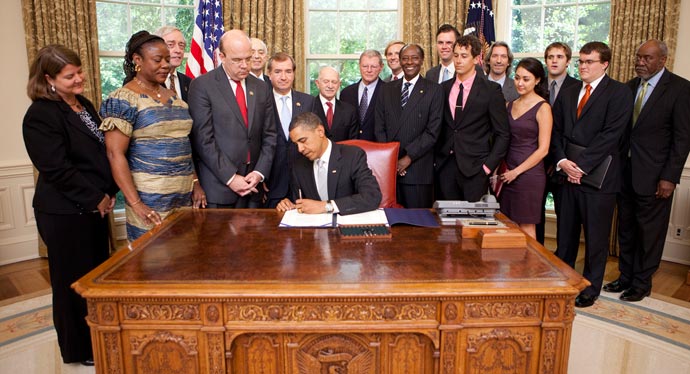
Just days after Enough Project and partner organizations Resolve and Invisible Children issued the third installment of our report card grading the efforts of the Obama administration to combat the Lord’s Resistance Army, the U.S. Secretary of State released its self-assessment—a report to Congress. The administration’s report highlights that the U.S. has increased its engagement on the LRA, particularly with the recent deployment of U.S. military advisors to assist regional efforts. However, more robust and sustained involvement is needed to avoid a repeat of previous, failed military operations–particularly Operation Lightning Thunder–and a continuation of the current foundering efforts.
Beyond deploying U.S. military personnel to assist regional armies to apprehend the LRA senior leadership, protect civilians, and promote defections, the administration has taken several other steps, as the report outlined:
- Encouraged Kinshasa to deploy its 391st battalion–trained and equipped by the U.S.–to LRA-affected areas in the Democratic Republic of Congo;
- Deployed a State Department Civilian Response Corps officer to the region;
- Provided equipment to the military of the Central African Republic, or CAR;
- Provided nearly $2 million to rehabilitate formerly abducted youth and approximately $102 million for recovery and reconciliation in northern Uganda;
- Expanded high-frequency radio networks in Congo; and
- Increased cell phone coverage in some areas in Congo through a pilot project that will hopefully lead to increased coverage in the Central African Republic, where a large portion of the LRA allegedly is, South Sudan, and other more remote areas of Congo.
According to the report, the State Department will also begin consultations with Congress to expand the statutory authority of the existing Rewards for Justice program, which provides rewards for information leading to the arrest or conviction of war criminals and terrorists.
While there has been progress, implementation of the LRA strategy has been generally limited. As Enough has written in two op-eds, our recent LRA paper, and blog posts, President Obama and his senior officials must step up their commitment and engagement in order to see the LRA ended, including by supporting the newly authorized African Union mission against the LRA.
With Kinshasa recently halting military operations by the Ugandan army in Congo, which could lead to a de facto safe haven for the LRA there, strained regional relationships urgently need to be addressed. Military operations should include protection strategies to prevent reprisal attacks, free abductees after attacks, and protect abductees who would likely be on the LRA’s front lines. Much more should be done to promote disarmament, demobilization, and reintegration, or DDR, efforts, including targeting high- and mid-level commanders and expanding DDR programming in the CAR, South Sudan, and Congo. And given the ongoing trial of former LRA combatant Thomas Kwoyelo, the U.S. should also urge Kampala to publicly clarify the status of the Amnesty Act of 2000 for LRA combatants–current and former–and fully grant amnesties in accordance with the act.
Also, there has been some discussion as to whether the advisors will conduct a “kill or capture” mission. One of the key goals of the mission should be to apprehend and bring to justice LRA leader Joseph Kony and his senior commanders. On this point, it is critical that not just Kony but also his top leaders be apprehended. A recent statement by General Ham indicated that the LRA “will probably wither” if Kony is captured: “This is not like another organization where if you take the top guy out somebody else can step in. It really is about him personally.” However, Enough research has shown that there are other commanders and leaders who would probably continue fighting if Kony alone were apprehended. Therefore limiting the mission, and U.S. involvement, in this way would be a grave mistake.
Photo: President Obama signing the LRA bill in May 2010 (White House)

